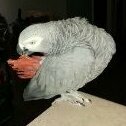NEW ADDRESS FOR MEMBERS GREYFORUMS.ORG
Leaderboard
Popular Content
Showing content with the highest reputation on 04/03/2018 in all areas
-
One of the lessons from my loved amazon Cricket was, talk to your companion and not at them. Try using a soft voice as you sit on a chair or stool next to their cage. Some times sit next to their cage and read or munch on a snack and not say anything. Talk to them like you would talk to your best friend in a calm voice and they will listen. This is about building relationships. They can read your body language and if your tone of voice is calm and soft they will enjoy you being there..3 points
-
2 points
-
Your grey is your new best friend, accept him the way he is and watch both of your lives grow... Show him love and let him live at his own pace ...Time is on your side...2 points
-
Hello my friend, Singing is great... Talk to him as much as you like, feel comfortable with him. A gray can tell how you feel...2 points
-
Im a little bit confused because I don’t know how long I should speak to him sometimes i sing to him with music in background is it good ?2 points
-
Our beloved Dave, may he rest in peace, always stressed that pet greys do not make good breeders and with that setup it doesn't look like they get the kind of privacy they need to properly breed. They do not like an audience for their mating practices. I would give up on trying to breed them if you keep them in this enclosure. Even if they were successful what do you plan to do with any babies? I don't mean to be so critical but do you have any experience with breeding greys?2 points
-
My friend, you need to set rules for yourself and stick with them.. Don't introduce anything that you don't want to be forced too do in the future. Your Grey is already training you well.....Give time a chance to work....2 points
-
2 points
-
1 point
-
Thank you Judy, Dave, A grey breeder extraordinaire, check out the sticky's in the Forums rooms, need I say more...Your cage doesn't have easy access to the parents or clutch...As you've seen, breeding greys is quite complicated, Fledgling them is a nightmare...My strongest advice is to work with a known breeder from hatch to fledged, if you wish to breed parrots...I'm sorry I won't be able to help you, I'm too old and too tired... I did it before on the Forum, in my younger days...You can't believe the stress and fear in raising and fledgling a clutch. No book can prepare you for the actual physical time and involvement needed and all the problems you are not aware of unless you have raised several different types of parrots. A Grey is one of the hardest to breed...if your heart is set on breeding, I advise to get proven pair of cockatiels and an experienced coach They're one of the easiest to breed....that includes costs etc..... Here's some sample questions: Are you going to use a syringe? A galvage tube? A Spoon? What formula are you planning to use? What temperature do you feed formula at? You start by feeding 6 times a day (24 hr)... When you pull them from the parents, what will you keep them in? Or, will you just remove them each time from the parents? What will you use to heat the clutch? What causes a crop impact and how would you attempt to cure it? What is aspiration and how does it happen? I won't even go into fledgling now.... My reasoning for pointing this stuff out to you is death is only a moment away at all times with no emergency care or cure...A proven point is the chance of getting a wonderful parrot by letting the parents raise them or hand-feeding is the same. What good breeders do now is leave the babies with the parents until they are on three feedings a day and 95% of the problems are gone. That way, they already know how to eat, they have seen you because you visit every day, and feeding is all they are interested in and they don't care who feeds them.... Whatever your decisions and choices are, we stand behind you....1 point
-
Thank you very much...you are doing a wonderful job...Suggestion; when using a water bottle, it's advisable to wash with white vinegar daily (don't rinse with water after using vinegar, never soap or bleach). Since you are so creative, Go to Amazon, type in "food and water bowls for parrots". There are some bowls you can get. Bless you...keep up the good work...we'll check back.1 point
-
Thanks jayd i will make some modifications.The nest box is "L" shaped and both of them fit inside comfortably I will add extra bowls but I can't put out a water bowl had that originally and they made a disaster they prefer tipping it over rather than drinking out of it.I appreciate your input it has helped a lot and I will keep u up to date when she's ready to nest again1 point
-
Alex the parrot is the only non-human to ask the existential question- “What color am I” Nov 27, 2016 Tijana Radeska Alex the parrot Alex was an African parrot born in 1976. He became famous for being the subject of a psychological experiment at three universities – University of Arizona, Harvard and Brandeis University. His uniqueness not only regarded his ability to learn names of individual objects but also identify the objects and their colors regardless of their shape. In 1977, Irene Pepperberg, a scientist, animal psychologist and professor at Brandeis University and Harvard University, bought the one-year-old Alex from a pet shop. At the time; she wanted to test if primates with bigger brains can handle complex problems related to language and understanding – a belief that didn’t include birds. African gray parrots, three weeks old Pepperberg named the parrot Alex who is an acronym for avian language experiment or avian learning experiment. She was aiming to test the bird’s intelligence and the experiment lasted for thirty years, until Alex’s death. According to Pepperberg, Alex had shown intelligence of a five-year-old human and the emotional level of a two-year-old human, and he didn’t even reach his full potential by the time he died. In her research, Pepperberg argued that if the intelligence of a single bird can be compared to the ones of dolphins and great apes, then birds are animals with creative potential for using words. African gray parrot from Gabon. Photo credit Or maybe Alex was an extraordinary bird who learned over 100 words. Maybe he didn’t learn them mechanically but rather creatively with an ability to understand what he said. When asked about the shape, color or material of a certain object, Alex could give a precise description. After he had learned the name of a certain object, Alex’s understanding of that particular object was tested by being exposed to the same one but in different shapes and colors. For example, when he was shown keys in different sizes, shapes, and colors, Alex had no problems with identifying the object. African gray parrot from Congo When he was put in front of a mirror, Alex inquired the answer to the first existential question ever asked by an anima – “What color?” – referring to himself. He had learned that his color is gray after being told six times. Until today, Alex is the only animal which posed a question about itself. Or, as it has been assumed by some scientists, he was just lucky to ask “irrational” question at the right moment. Here is another fun read from us:Medieval animal trials in Europe – A pig sentenced to death by hanging for murder Alex died suddenly in 2007, at the age of 31. African gray parrots live an average life of sixty years, so Alex’s death was a surprise for everyone, particularly as he was in good health at the time. Pepperberg stated that it is a huge loss, but it wouldn’t stop the research. On the contrary, she claimed that it would be a setback. The lab has two other birds, yet not as comparable to Alex.1 point
-
1 point
-
The last year and especially the last six months have been very hard on me, but I hope to be back on track soon.. And as always thanks for caring Jay.1 point
-
1 point
-
Thank you my friend..laying down is not natural for you or him. If a person continues to do something like this, the only time a Fid will calm down is when you are in this position. A Grey is extremely literal; another important point along the same reasoning is that is you are upset at your Grey, you talk to him in an upset tone of voice and a happy voice when you are happy with him.1 point
-
Can you sit on the floor in front of his cage? That's how I started with Dorian - sitting on the floor in front of his cage talking to him and playing with toys.1 point
-
Erfan, Greys time is counted in weeks and months and years, he need to be back in the room, it might take a year to realize anything,,Please don;t lay beside him, it;setting a bad example, be fluent with him, raise his cage ad leave it alone...Puffed feathers are normal, he's acting normal...You have to live on parrot time.....It could take years before you get the reactions you hope for...Act normal around him....1 point



